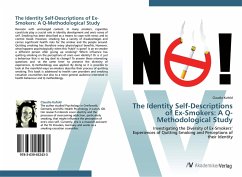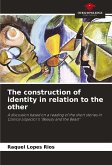Revision with unchanged content. In many smokers, cigarettes constitute play a crucial role in identity development and one's sense of self. Smoking has been described as a means to cope with stress and to control mood. However, smoking has a variety of disadvantages and carries significant health risks for the smoker and the people around. Quitting smoking has therefore many physiological benefits. However, what happens psychologically when this "habit" is gone? Is an ex-smoker a different person after giving up smoking? Which influence has quitting smoking on the perceptions of one's own identity? Or is it just a behaviour that is no big deal to change? To answer these interesting questions and -at the same time- to preserve the diversity of experiences, Q-methodology was applied. By doing so it is possible to look at the manifold ways ex-smokers describe their process of quitting smoking. This book is addressed to health care providers and smoking cessation counsellors but also to a more general audience interested in health behaviour and Q-methodology.
Hinweis: Dieser Artikel kann nur an eine deutsche Lieferadresse ausgeliefert werden.
Hinweis: Dieser Artikel kann nur an eine deutsche Lieferadresse ausgeliefert werden.








